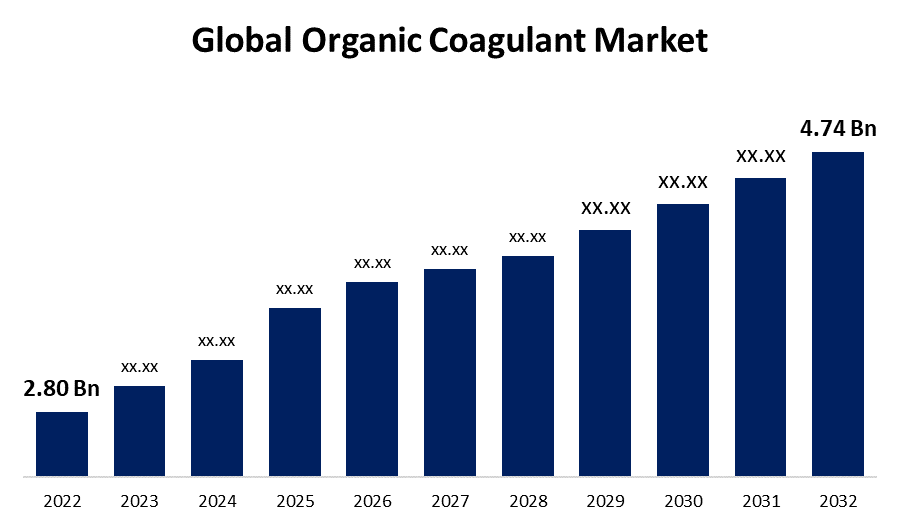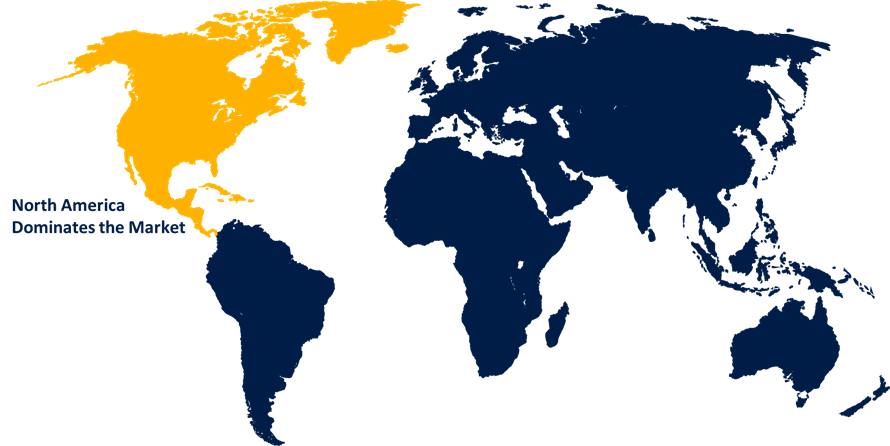Global Organic Coagulant Market Size To Worth USD 4.74 Billion by 2032 | CAGR of 9.6%
Category: Chemicals & MaterialsGlobal Organic Coagulant Market Size To Worth USD 4.74 Billion By 2032
According to a research report published by Spherical Insights & Consulting, the Global Organic Coagulant Market Size To Grow from USD 2.80 Billion in 2022 to USD 4.74 Billion by 2032, at a Compound Annual Growth Rate CAGR of 9.6% during the forecast period.

Get more details on this report -
Browse key industry insights spread across 200 pages with 110 Market data tables and figures & charts from the report on the "Global Organic Coagulant Market Size, Share, and COVID-19 Impact, By Type (Polyamine PolyDADMAC), By Application (Municipal Water Treatment, Industrial Water Treatment), by Region (North America, Europe, Asia-Pacific, Latin America, Middle East, and Africa), Analysis and Forecast 2022 – 2032." Get Detailed Report Description Here: https://www.sphericalinsights.com/reports/organic-coagulant-market
Organic coagulants are substances derived from natural sources and used in a range of industrial processes, such as the treatment of water and wastewater, to promote the coagulation or flocculation of particles. Coagulation is the process of destabilising and clumping together smaller particles into larger ones in order to make it easier to remove pollutants, colloids, and suspended particles from a liquid. Organic coagulants are typically preferred over traditional inorganic coagulants (such as ferric chloride or aluminium sulphate) because of their reduced tendency to produce harmful byproducts and environmental friendliness. They are widely used in applications where it is crucial to keep inorganic coagulants' metal ions at bay.
COVID 19 Impact
The epidemic's effects on global supply chains included lockdowns, limitations, and a reduction in production capacity. This disruption might have affected the availability of the raw ingredients required to make organic coagulants, which could have altered supply and demand. In numerous countries, restrictions and lockdowns were put into place, which limited industrial activity and, as a result, some sectors' needs for water treatment. The decline in demand for water treatment services may have had an effect on the market for organic coagulants. Projects and investments in water treatment facilities may have been put off as a result of the pandemic's uncertainty, which could have had an impact on the development of the organic coagulants market.
Demand for organic coagulants has increased as a result of the need for environmentally friendly water treatment techniques and rising environmental consciousness. They are able to make the most of their time and resources because they are the only ones who can do it. Growing populations and industrial expansion have increased the need for efficient and effective water treatment technology. It has been demonstrated that the use of organic coagulants in water treatment, such as the elimination of turbidity, heavy metals, and other contaminants, is advantageous. Because of the rising need for dependable water treatment options brought on by industrialisation and urbanisation in developing countries, the market for organic coagulants has expanded.
Inorganic coagulants have established supply chains and a proven track record for a very long time. It can be challenging to convince consumers to switch from popular inorganic coagulants to organic alternatives. Additionally, many water treatment professionals and stakeholders might not completely comprehend the benefits and possibilities of organic coagulants. It is essential to inform people about their effectiveness and value to the environment in order to enhance their adoption. Organic coagulants can be more expensive to produce than ordinary inorganic coagulants, which may make it difficult for them to be extensively employed, especially in countries where price is a significant consideration. The stability of the supply chain may be impacted by factors such as the climate, seasonal variations, and agricultural practises.
Type Insights
Polyamine segment to dominate the market over the forecast period
On the basis of type, the global organic coagulant market is segmented into Polyamine, PolyDADMAC, and others. Among these, the polyamine segment is going to dominate the market over the forecast period. Due to their use in a range of water treatment applications, polyamines are a flexible choice for many companies and industries. Their effectiveness in a range of pH levels and challenging water situations is the cause of their rising popularity. As a result of continuous research and development initiatives that have produced polyamine-based coagulants with improved performance characteristics, more users are becoming interested in the market. Polyamines are proven to have good coagulation and flocculation properties, making them particularly effective at removing suspended particles, colloids, and other pollutants from water. They are as effective as or more effective than traditional inorganic coagulants.
Application Insights
Municipal Water Treatment accounted the largest market share over the forecast period
Based on the application, the global organic coagulant market is segmented into Municipal Water Treatment, Industrial Water Treatment. Among these, municipal water treatment segment accounts the largest market share over the forecast period. The environmental harm caused by conventional inorganic coagulants used in water treatment is becoming more and more recognised by municipalities and government agencies. Organic coagulants are thus gaining popularity as a result of their biodegradability and reduced production of harmful byproducts, which makes them perceived as being more ecologically benign. Rapid urbanisation and population growth have increased the need for efficient and sustainable water treatment solutions in municipal water treatment facilities. As public awareness of water quality and health-related issues increases, consumer demand for cleaner, safer drinking water is on the rise. The use of organic coagulants in the treatment of municipal water systems is a growing trend in the United States.
Regional Insights
North America dominates the market over the forecast period

Get more details on this report -
Among all other regions, North America dominates the market over the forecast period. The general public is becoming more aware of the effects of water pollution and the importance of environmentally friendly water treatment techniques. Because organic coagulants are thought of as being greener and more environmentally friendly, there is a developing demand for them. Many businesses in North America use organic coagulants to purify their wastewater, including those that process food and drinks, create pulp and paper, and make textiles. Due to their efficiency and conformance to environmental standards, organic coagulants are being employed in industrial processes more frequently.
Asia Pacific is witnessing the fastest market share over the forecast period. The Asia-Pacific region has some of the world's most populous countries, many of which have experienced rapid urbanisation and industrialization. Demand for clean, safe water has increased as a result of urbanisation and population growth, necessitating the employment of effective water treatment methods such organic coagulants. A significant volume of wastewater generated by the region's growing industrial sector needs to be adequately treated before being released. Organic coagulants are being used more frequently in a range of industries, including food and beverage, pharmaceuticals, textiles, and chemicals, to effectively treat wastewater.
Market Segment
This study forecasts revenue at global, regional, and country levels from 2019 to 2032. Spherical Insights has segmented the global Organic Coagulant Market based on the below-mentioned segments:
Organic Coagulant Market, Type Analysis
- Polyamine
- PolyDADMAC
- Others
Organic Coagulant Market, Application Analysis
- Municipal Water Treatment
- Industrial Water Treatment
Organic Coagulant Market, Regional Analysis
- North America
- US
- Canada
- Mexico
- Europe
- Germany
- Uk
- France
- Italy
- Spain
- Russia
- Rest of Europe
- Asia Pacific
- China
- Japan
- India
- South Korea
- Australia
- Rest of Asia Pacific
- South America
- Brazil
- Argentina
- Rest of South America
- Middle East & Africa
- UAE
- Saudi Arabia
- Qatar
- South Africa
- Rest of Middle East & Africa
About the Spherical Insights & Consulting
Spherical Insights & Consulting is a market research and consulting firm which provides actionable market research study, quantitative forecasting and trends analysis provides forward-looking insight especially designed for decision makers and aids ROI.
Which is catering to different industry such as financial sectors, industrial sectors, government organizations, universities, non-profits and corporations. The company's mission is to work with businesses to achieve business objectives and maintain strategic improvements.
CONTACT US:
For More Information on Your Target Market, Please Contact Us Below:
Phone: +1 303 800 4326 (the U.S.)
Phone: +91 90289 24100 (APAC)
Email: inquiry@sphericalinsights.com, sales@sphericalinsights.com
Contact Us: https://www.sphericalinsights.com/contact-us
Follow Us: LinkedIn | Facebook | Twitter
Need help to buy this report?